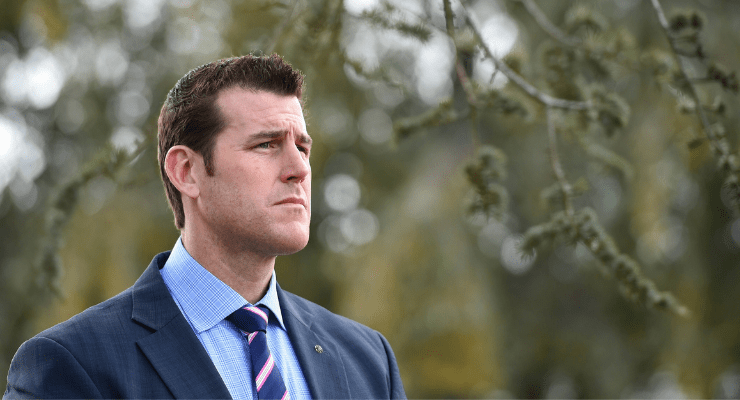
With Christian Porter dumping his case against the ABC, there’s now only one blockbuster defamation action in town. Ben Roberts-Smith’s lawsuit against the Nine newspapers kicks off in the Federal Court in Sydney on Monday, and the stakes could not be higher.
On one side of the courtroom is Australia’s most decorated living veteran, a Victoria Cross recipient who has the support of one of Australia’s richest men, billionaire owner of Seven West Media Kerry Stokes. On the other is one of Australia’s leading investigative journalists, Nine’s Nick McKenzie, whose reporting on war crimes in Afghanistan has been corroborated not only by the work of other journalists but by an official inquiry by the inspector-general of the Australian Defence Force.
Amid the spectacle and drama leading up to the trial, it’s easy to forget exactly why Roberts-Smith is suing and what he has been accused of.
It all began with a story in The Age and The Sydney Morning Herald in June 2018 referring to an unnamed Special Air Service Regiment (SAS) soldier as an alleged war crime suspect, who witnesses claimed kicked a handcuffed Afghan civilian off a cliff before ordering his execution.
Roberts-Smith’s response to the reporting was quick: within weeks he had launched defamation proceedings against McKenzie and his employer. But it’s been far from straightforward since then.
In November 2020 it was confirmed Stokes was bankrolling Roberts-Smith’s legal action, which Crikey reported is likely to have spiralled into the millions.
Roberts-Smith’s former wife, who was expected to appear for the defence, has flipped and will give evidence on behalf of the newspapers. She claims Roberts-Smith asked her to lie in court. Roberts-Smith has launched separate proceedings against her in the Federal Court, fulfilling a threat he made earlier to sue her if she spoke to the newspaper’s lawyers.
Undeterred by a looming defamation trial, McKenzie followed up his reporting in April with extraordinary claims that Roberts-Smith allegedly buried evidence of war crimes in his backyard in a pink plastic children’s lunchbox, and sent intimidating emails to potential witnesses, which if proven in court would constitute a criminal offence.
Secret recordings also revealed Roberts-Smith spoke openly about “destroying” the media organisations that had exposed his alleged behaviour, and claimed he would be “fucked” without the support from Stokes, whose media empire had also kept him on as an executive before his resignation last month.
By backing Roberts-Smith, Stokes has gone to war with an old rival — Nine. This has made media coverage leading up to the legal battle sharply polarised. The cult of Roberts-Smith as a war hero who can do no wrong still dominates the narrative in many of the country’s papers, none more so than Stokes’ powerful The West Australian.
The millionaire’s loyalty to Roberts-Smith in the face of some of the most brutal allegations is also deeply personal: Stokes is an avid worshipper of the elite SAS, and is a trustee of the SAS resources fund, which provides relief to members of the regiment. When the Brereton report was released, Stokes promised financial support to the families of SAS troops accused of war crimes.
He also sits on the board of the Australian War Memorial.
Stokes has funded the costly legal battle through his personal investment vehicle, Australian Capital Equity (ACE), which as of late last year had already cost him $1.9 million. And it’s not just the cost. There’s also the complexity of a trial involving highly sensitive national security issues, which will require some witnesses and material to be heard in closed-court sessions.
With more than 70 witnesses, including people in Afghanistan and current and former SAS soldiers, the trial is expected to take at least 10 weeks. But whether the so-called trial of the century will deliver any clear winners remains to be seen.
“Given the polarisation of the issue, I’m not sure that success for either party will be able to shift public perceptions,” University of Sydney media law expert David Rolph said.
“Where you’ve got those kinds of high stakes, it’s always going to lead to a very fiercely contested defamation case.”








Crikey encourages robust conversations on our website. However, we’re a small team, so sometimes we have to reluctantly turn comments off due to legal risk. Thanks for your understanding and in the meantime, have a read of our moderation guidelines.